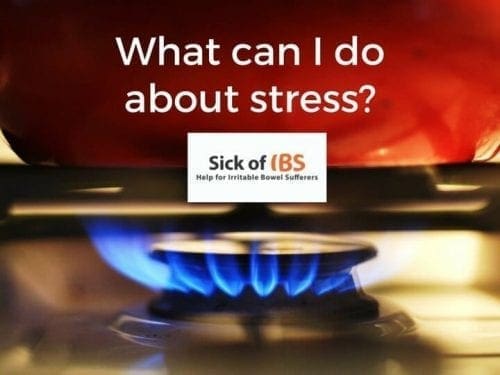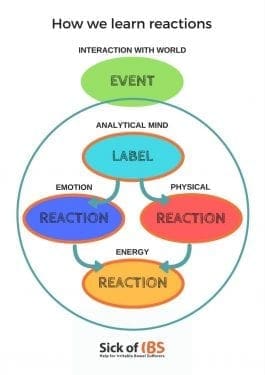I used to think that stress was something I had to endure and had no control over. So learning that stress could be fuelling my IBS just made me feel even more helpless. But then I discovered that we don’t just have to put up with it. We can actually do something to reduce stress.
This is not something that is easy to do. However if you think that stress is fuelling your IBS (stress and IBS often go together), it is worth investing the necessary time and energy to improve your relationship with stress.
What is stress all about?
At a basic level, stress is a fear reaction to something we perceive as dangerous for us. It is a primary survival mechanism we are born with, and that helped our species survive over the centuries.
We get a stress reaction to anything we sense as potential danger. It can be triggered by many different things: a person, a sound, a situation, even a smell. We react according to our beliefs, our core values, who we are, our environment, and our past experiences. This is why one person may find a situation stressful, while another may feel totally calm.
When we sense danger, our analytical mind labels the situation as “danger” and we get a rush of the emotion of fear.
Simultaneously we have a physical reaction, the famous flight or fight mechanism. Our body releases cortisol and adrenaline.
Our breathing becomes fast and shallow, our heart beats faster and we physically prepare ourselves to fight or run fast.
And secondary actions, like digestion, are slowed down to divert energy to our arms and legs, the parts of our bodies that will need to take direct action – either to physically fight off the danger, or to run fast.
For IBS sufferers this stress can translate into slow transit and constipation, or fast nervous transit like diarrhea.
The stress reaction
Fear can energise us and give us more potential and choices in a situation. An example of this would be a person who uses this energy positively when giving a presentation, and speaking particularly clearly and with impact, more so than in the office.
However, fear can also make us freeze and react in a way that does not help. if we perceive and label fear as a negative reaction, as something undesirable, it will lower our energy levels and can significantly reduce our capacity to react. This will, for example, be the person that gets so nervous at making a presentation that they will have an IBS flare-up, speak quickly, in a quiet voice and lose track of what they are saying. Although they are perfectly capable of speaking clearly to their friends.
So you see how our negative perception of stress can actually make a situation worse.
The role of the subconscious in stress
There are many times where our stress reaction feels automatic. This is because we have learned our systematic negative perception of fear over time through experience. It has become stored as a reference in our subconscious mind, in the same way as we do other automatic reactions.
Trauma and stress triggers
I always thought that trauma was something that happened after very serious life events. And these could result in post traumatic feelings, reactions and triggers to sounds, sensations, visual elements that mirrored that traumatic event, even when a person is in a “safe” environment.
I later learned that it is possible to develop a stress trigger to a situation of much lesser intensity if it is repeated sufficiently. This is called soft trauma. If you experience a stressful situation at school, at work, at home, in everyday life – and this same experience, or interaction with a person, is repeated regularly over several months or years, this can create a trigger. And this trigger can be what sets your IBS symptoms off: an IBS trigger.
These pre-established triggers become automatic. And this is where they can seriously get in our way. A trigger can set off unwanted and exaggerated thoughts, feelings and physical reactions – every time you are triggered.
So how can I reduce stress?
Although we feel that we undergo stress, we actually have a part in creating our reaction to stress. Realising this is an important first step in taming the beast.
1) Reduce your reactivity to stress by learning to relax more
If you find your stress has built up over time, you may be living in a heightened state of general stress with your adrenals locked in the “on” position. In this case, any steps you take to reduce your reactivity and soothe yourself will be effective.
This can involve starting yoga, meditation, deep breathing, tai chi, listening to music, doing something you love, having fun – anything that allows you to switch off, take a step back and feel less reactive.
2) Consciously avoid the stimuli
Avoiding the cause of your stress can be useful short-term if you are aware of what stresses you. It doesn’t however remove the trigger reaction.
3) Learn to become more aware of specific triggers
If you are aware of your triggers you can choose a more adapted response. By noting down every day when you feel triggered and details of that situation in a journal, you may notice patterns over time that tell you a great deal about what your triggers are.
In some cases just noticing the reaction will be sufficient to reduce your level of reactivity to them.This gives you back some control in situations that seem automatic. Therapies to help you with this do this include Cognitive Behavioral Therapy
4) Find the trigger(s) and rewire or release specific stress reactions
Sometimes we have situations linked to past trauma (even soft trauma) that keep triggering us. We may experience regular situations where we feel emotionally overwhelmed. Or where we don’t feel capable of acting in a calm, thought out way.
If you feel trapped with this type of trigger, it is wise to get some outside help. Quite simply, we cannot see ourselves and our trauma triggers. We need the outside view of someone who can help us untangle trauma, its roots and ou reactions to it.
NLP (neuro-linguistic programming) is an excellent tool for changing trigger situations. I became a certified NLP practitioner as I found it really helped me understand and durably change trigger patterns. NLP is based on slightly changing our perceptions of a trigger situation in order to reduce or remove our negative stress reaction to it.
I would recommend consulting a practitioner who has personal experience with IBS.
5) Rebalancing your energy
This aspect is often overlooked when dealing with stress. Alternative therapies like acupuncture or Reiki to help rebalance the normal flow of energy in your body.
Regular practice of Tai Chi can boost your energy flow as well as relax the body and mind. If you want to start, I recommend these 5 beginners modules of Tai Chi by Taiflow.
7

